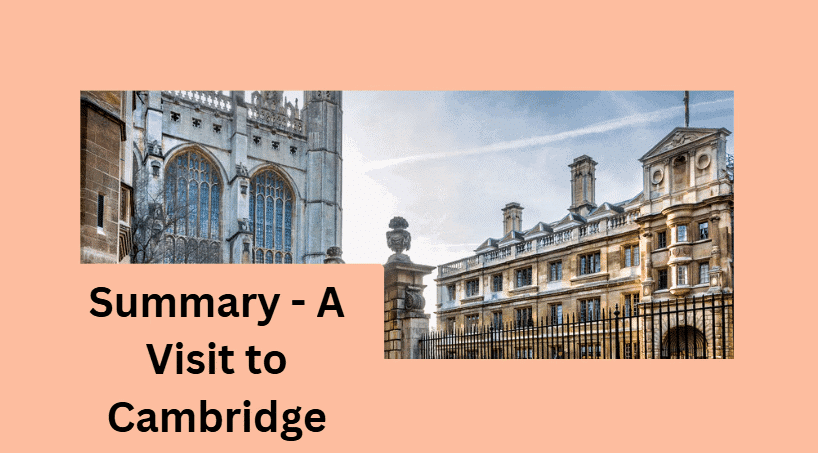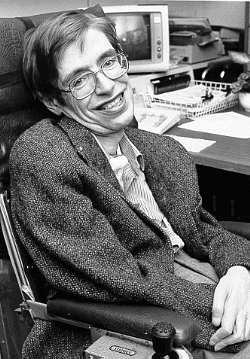A Visit to Cambridge Summary Class 8 English Honeydew Chapter 6
| Table of contents |

|
| Key Points of the Story |

|
| Detailed Summary |

|
| Theme/Message |

|
| List of Difficult Words with Meanings |

|
This chapter captures the moving interaction between Firdaus Kanga and Stephen Hawking, two extraordinary individuals overcoming physical challenges. Their conversation explores resilience, misconceptions about disability, and the power of focusing on one’s strengths, leaving readers inspired by their courage and wisdom.

Key Points of the Story
- Introduction of Stephen Hawking and Firdaus Kanga, both disabled.
- Kanga's visit to Cambridge and the decision to meet Hawking.
- The meeting was arranged through Hawking’s assistant.
- Initial interaction and observation of Hawking’s communication struggle.
- Discussion on misconceptions about disabled people.
- Kanga's admiration for Hawking’s intellectual presence.
- Hawking’s views on disability and advice for disabled individuals.
- Reflection on personal experiences and limitations.
- Emotional farewell and Kanga’s sense of closure and inspiration.
Detailed Summary
This narrative recounts the meeting of two extraordinary individuals, both "differently abled":
- Stephen Hawking, a renowned scientist, and
- Firdaus Kanga, a writer and journalist.
Hawking, who suffers from a form of paralysis that confines him to a wheelchair and limits his speech to a computer-generated voice, and Kanga, who was born with brittle bones and also uses a wheelchair, share their perspectives on life with disabilities.
Kanga's journey begins in Cambridge, a city he sees as a metaphor for England. During a walking tour, the guide mentions Stephen Hawking, describing him as a brilliant yet severely disabled astrophysicist, a successor to Isaac Newton at the university. This reminder prompts Kanga to contact Hawking's house, where he arranges a half-hour meeting with the professor.
 Cambridge and the Extraordinary Stephen Hawking
Cambridge and the Extraordinary Stephen Hawking
The next afternoon, Kanga meets Hawking, feeling excited and nervous. As someone who has grown tired of being told to be brave, Kanga finds strength in seeing someone like him achieving great things. He realizes the importance of role models in showing what is possible despite physical limitations.
Hawking's disembodied computer voice asserts that he has not been brave, but simply had no choice in dealing with his condition. Kanga refrains from arguing, feeling guilty for making Hawking respond to him. He observes Hawking's struggle to communicate, using the limited movement in his fingers to control his speech device, which often leaves him exhausted.
During their conversation, Kanga addresses the misconception that disabled people are always unhappy, to which Hawking responds that he finds it amusing when people patronize him. When asked if he finds such interruptions annoying, Hawking bluntly confirms but smiles, showing a sense of humor and resilience.
Kanga describes his initial shock at seeing Hawking, whose appearance is like a three-dimensional photograph:
- head twisted
- torso shrunken, and
- legs wasted.
Despite this, Hawking's eyes convey a powerful, urgent message. Kanga feels he is witnessing something profound, seeing Hawking as an embodiment of pure intellect and spirit, transcending his physical form.
In their exchange, Kanga asks Hawking what he thinks is the best thing about being disabled. Hawking responds that there is nothing good about it. Kanga counters, suggesting that it reveals the kindness in the world, but Hawking's synthesized voice lacks the nuance to show agreement or disagreement clearly.
Throughout the meeting, Kanga feels a renewed appreciation for his body's capabilities, however limited they might be. He realizes that despite his inability to walk or stand, he has much to be grateful for. He shares how Hawking has been an inspiration to him and others, but Hawking dismisses the notion, emphasizing the isolating nature of his condition.
Kanga then asks if Hawking has any advice for disabled people. Hawking advises focusing on what they are good at and dismisses activities like the disabled Olympics as a waste of time. Kanga reflects on his own futile attempts to play a large Spanish guitar and the relief he felt when he finally gave it up.
As their allotted time ends, Kanga prepares to leave, but Hawking invites him to stay for tea and a tour of the garden. They navigate the garden, with Hawking in his motorized wheelchair and Kanga following. The sun makes conversation difficult as the glare obscures Hawking's screen.
When it is time to part, Kanga feels unsure how to express his gratitude and admiration. He touches Hawking's shoulder and leaves, looking back to see Hawking in his chair, symbolizing the embodiment of Kanga's bravest self. This meeting concludes a significant chapter in Kanga's journey, providing him with a sense of closure and renewed purpose.
This encounter between Hawking and Kanga highlights the unique challenges and triumphs of living with a disability. It underscores the importance of resilience, the power of inspiration, and the profound impact of human connection, even in the face of immense physical limitations. Through their shared experience, both men demonstrate that true strength lies not in physical prowess but in the courage to live fully and meaningfully despite the odds.
Theme/Message
The main theme of this chapter is the resilience and strength found in individuals living with disabilities. It highlights the importance of role models in inspiring others to overcome their limitations and pursue greatness despite challenges. The narrative underscores the misconceptions about disabled individuals and emphasizes the value of human connection, empathy, and the shared experience of navigating life's difficulties.
List of Difficult Words with Meanings
- Extraordinary - Very unusual or remarkable.
- Disabled - Having a physical or mental condition that limits movements, senses, or activities.
- Paralysis - Loss of the ability to move in part or most of the body.
- Astrophysicist - A scientist who studies the physical properties of celestial bodies.
- Brittle - Hard but liable to break or shatter easily.
- Metaphor - A figure of speech in which a word or phrase is applied to an object or action to which it is not applicable.
- Disembodied - Separated from or existing without the body.
- Synthesiser - An electronic musical instrument or device that produces sounds by generating electrical signals.
- Inflection - A change in the form of a word (typically the ending) to express a grammatical function or attribute.
- Claustrophobic - Having an extreme or irrational fear of confined places.
- Exhilaration - A feeling of excitement, happiness, or elation.
- Incandescence - Emitting light as a result of being heated.
- Chronically - Persisting for a long time or constantly recurring.
Some Interesting FAQs of "A Visit to Cambridge":
Q1. What is Cambridge’s significance in the story?
Ans. Cambridge serves as the backdrop for Firdaus Kanga’s visit and symbolizes a hub of learning and excellence, where Stephen Hawking made significant contributions as a scientist.
Q2. Who was Stephen Hawking, and why is he famous?
Ans. Stephen Hawking was a world-renowned astrophysicist known for his work on black holes and cosmology. He is celebrated for his resilience in overcoming a severe physical disability caused by motor neuron disease.
Q3. Why does Firdaus Kanga feel inspired by Stephen Hawking?
Ans. Kanga is inspired by Hawking’s achievements, which show that physical disabilities do not limit intellectual brilliance or the ability to impact the world.
Q4. What misconceptions about disabled people are addressed in the story?
Ans. The story challenges the misconception that disabled people are always unhappy or need constant pity and shows how they can achieve greatness.
Q5. What does Kanga observe about Hawking during their interaction?
Ans. Kanga notes Hawking’s struggle to communicate using his speech device, his powerful gaze, and his resilience despite his physical limitations.
|
36 videos|330 docs|56 tests
|
















